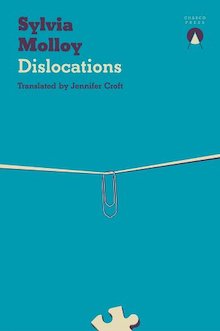
tr Jennifer Croft
Charco, 2022
A novel about memory and its loss, Dislocations by Sylvia Molloy is written in short chapters that feel as though they were taken from a daily journal. It is possible they were. According to the jacket copy, Dislocations is a work of fiction. But the narrator’s friend and central concern, a woman named M.L. who suffers from dementia, was also a real person, a friend and literary collaborator of the author. That Dislocations exists in a space between fiction and nonfiction may well be intentional. Over the course of her long career, Molloy herself wrote scholarly work about autobiography; it is a subject she knew well. “Maybe I’m making up everything I’m writing now. Ultimately no one could say otherwise,” the narrator says, in a chapter suggestively titled “Narrative Liberty.”
The fiction/nonfiction question is not the only dislocation in this slim novel, admirably translated by Jennifer Croft. One might begin with the title. Rendered in English as Dislocations, the original Spanish title, Desarticulaciones, might refer to literal disarticulation, which Merriam-Webster defines as: “separation or amputation of a body part at a joint.” Dislocation, in contrast, is defined as “displacement of one or more bones at a joint” or “disruption of an established order.” Unless one is carving a turkey, or performing orthopedic surgery, these are small differences; by bringing them out, I don’t intend to criticize the translator’s choice but only to explore what it evokes. To disarticulate derives from dis– plus articulare, to “separate into joints” and “to utter distinctly,” while dislocate derives from the Latin dislocare, to “put out of place.” Is this work about dis-locating or dis-articulating? Perhaps both, for M.L. and her friend have been displaced in space and in language.
Dislocations is not merely about loss of memory, for language and home are disappearing as well. Both the narrator and M.L. are Argentinians living in the United States. Their lives and words have been translated; translation itself is a skill that M.L. retains after much of her memory has faded. As M.L.’s condition worsens, her use of language devolves, and with it, Molloy tells us, goes a common language based on their shared history. For them, this language created a sense of home that could not be found elsewhere.
Although Dislocations is about M.L. and her progressive dementia, it is also about the narrator. When M.L. addresses her friend using “tú” instead of their more usual “vos,” the narrator feels that she “had become even less myself for her sake.” At the end of their conversation, she reports: “I sensed I’d lost yet more of what had been left of me.” When the narrator’s own memories intrude on her in an unwanted fashion, she feels resentful. “I want to be the proprietor of my memory, not for my memory to be in charge of me.” Losing her friend, seeing her slip away a little more daily, forces the narrator to confront her own past, her memories, and what she stands to lose. In “Premonition,” the narrator admits to having troubled dreams and anxiety: “It was as if I suddenly had a hole in my brain through which something was overflowing, something that had happened at some remote time, but not in a dream, something I couldn’t remember.”
There is much to unpack in this meaningful little book which asks a compelling question: once we’re forgotten, does it matter that we were there? The question arises most poignantly in the chapter titled “Farewell.” The narrator is about to leave after a visit with M.L., who has fallen asleep. Her caregiver suggests the narrator can leave without waking her to say goodbye. After all, M.L. will forget the visit anyway. Even so, the narrator protests, “It’s not the same.”
Just as individual recollections do not encompass an entire life, each chapter of Dislocations can be articulated and disarticulated like beads on a string—or items on a list. In a way, the novel is also a book of lists, beginning with “Disconnection” (the first chapter) and ending with “Interruption.” In a chapter titled “Lists,” the narrator muses that “in the absence of its author, there is no one who can give [the list] meaning.” Since Molloy’s death last year, the question of an absent author becomes even more poignant. I’d argue that this book continues to bear witness to her life and works, so indeed one can be past remembering and yet still matter. One can only hope that more of her work will appear in English translation.
+++
Formerly Albert Schweitzer Professor of Humanities Emerita at New York University, Sylvia Molloy (Buenos Aires, 1938-2022) was a novelist, essayist, and a leading literary critic of Latin American literature. She was the author of two novels in Spanish, En común olvido (2002) and En breve cárcel (1981), as well as numerous works of short fiction and criticism. She was a fellow of the Guggenheim Foundation, the National Endowment for the Humanities, the Social Science Research Council, and the Civitella Ranieri Foundation. Dislocations is her first work of fiction to appear in English.
+
Jennifer Croft won the 2020 William Saroyan International Prize for Writing for her memoir, Homesick, and the 2018 Man Booker International Prize for her translation from Polish of Olga Tokarczuk’s Flights. She has also translated Federico Falco’s A Perfect Cemetery, Romina Paula’s August, Pedro Mairal’s The Woman from Uruguay, and Tokarczuk’s The Books of Jacob. She holds a PhD from Northwestern University and an MFA from the University of Iowa.
+
Shara Kronmal is a physician, writer and translator from French to English. She is an editorial assistant at CRAFT Literary Journal. Her essays and translations have appeared in Please See Me, The Journal of the American Medical Association, and Hunger Mountain Review. She lives in Chicago.